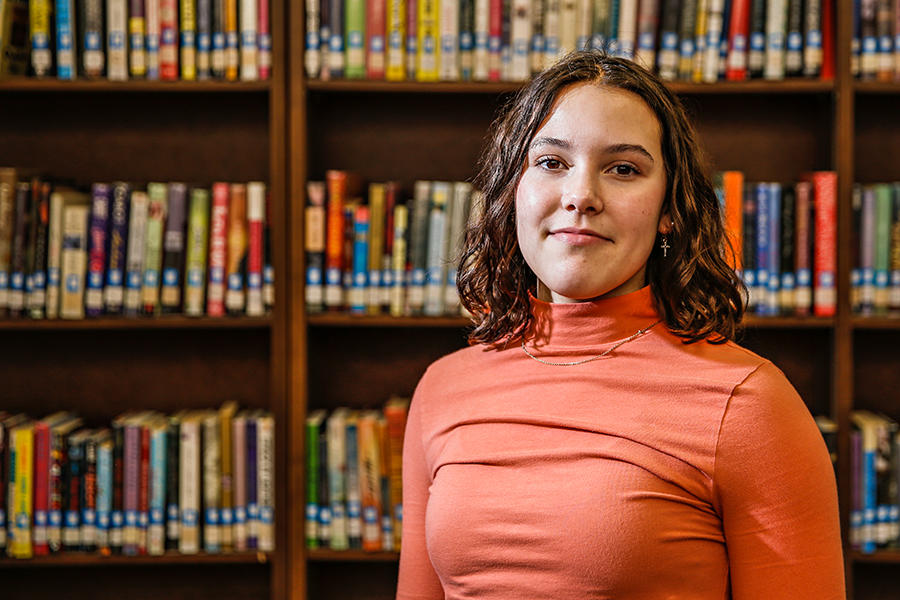Poetry on the Rise
Amid the literary form’s soaring modern popularity, Flathead High School sophomore Isabella Shinn becomes school’s third Poetry Out Loud state winner
By Myers Reece
By a number of metrics, poetry is enjoying an era of peak popularity.
The 2017 Survey of Public Participation in the Arts revealed that the number of poetry readers in the U.S. had grown significantly over the previous five years, from 6.7% of adults to 11.7%. That means 28 million American adults reported reading poetry in the previous year. The surge, which continues today, is driven by a number of factors, not the least of which is poetry’s increasingly diverse representation.
Across the pond in the UK, sales of poetry books hit an all-time high in 2018, according to Neilsen BookScan, growing by 12% over the prior year. Platforms such as Instagram have opened up new avenues for poets and readers, while redefining our conception of the very definition of poetry.
Meanwhile, the television series “Poetry in America” has proven to be popular across a wide spectrum of demographics, featuring an eclectic mix of special guests, including U.S. Supreme Court Justice Elena Kagan, politicians such as the late John McCain and Bill Clinton, musicians Bono and Herbie Hancock, the rapper Nas, former NBA basketball star Shaquille O’Neal and many others.
Poetry as an auditory and visual experience, as rendered in “Poetry in America,” has also made headway in schools across the country through Poetry Out Loud, a poetry recitation contest that launched in 2005 as a partnership between the National Endowment for the Arts, Poetry Foundation and state and jurisdictional arts agencies, including the Montana Arts Council.
Alison Kreiss, an English teacher at Flathead High School who administers Poetry Out Loud in her classes, said contest participation has sharply risen in step with poetry’s broader popularity growth. The competition now involves more than 3.8 million students and 60,000 teachers from 16,000 schools in every state, the District of Columbia, Puerto Rico, and the U.S. Virgin Islands.
“I think there’s more interest in poetry than ever,” Kreiss said. “I think it’s a growing, vital area, whether they’re learning about poetry that has been written by other people and exploring their literary heritage through poetry or using it as inspiration for their own writing. Poetry is in a renaissance period.”
Flathead High has also produced three state champions: Joshua Kelley in 2007, Anna Hedinger in 2018 and most recently sophomore Isabella Shinn, who won the state contest in Helena on March 7 and earned what would have been an all-expenses-paid trip to Washington D.C. for the April 27-29 national competition until the event was canceled due to COVID-19.
Shinn was awarded $200 for winning state, and Flathead High received $500 to purchase poetry materials. The stakes rise at nationals, where $20,000 in scholarship money would have gone to the winner if the competition hadn’t been canceled, with an additional $10,000 distributed to the runner-up, $5,000 to third place and other top finishers receiving sizable chunks of scholarship money.
“In the weeks to come, we will explore ways to honor the achievements of the 2020 Poetry Out Loud champions,” the contest’s website stated in a March 14 message announcing the cancellation.
Shinn memorized and recited three poems to win the state championship: “The Windhover” by Gerard Manley Hopkins, “For the Dogs Who Barked at Me on the Sidewalks in Connecticut” by Hanif Abdurraqib and “‘Un Tintero,’ Inkwell,” a bilingual poem by Desirée Alvarez.
“I enjoy poetry, especially reciting it,” Shinn said.
As a freshman, Shinn said she was so “sick with nervousness” before the competition that she “couldn’t even eat.” But this year she felt more comfortable onstage in front of the audience, although she still had nerves, which she chalks up to part of the experience.
“You stand up there and your legs are shaking a little bit, but it’s fun,” she said.
The evolution of Shinn’s confidence speaks to Poetry Out Loud’s mission statement, which calls for helping students to “master public speaking skills, build self-confidence, and learn about literary history and contemporary life.”
Kreiss said Shinn was thoughtful with her poetry choices, opting for selections that were both interesting and complex, and performed them expertly.
“Bella has a radiant presence onstage, and she can convey the gravity of her selections,” Kreiss said. “That combination, along with her really beautiful voice, is really compelling. She’s able to understand the poems and deliver them to an audience in a way that we can understand them just through listening.”